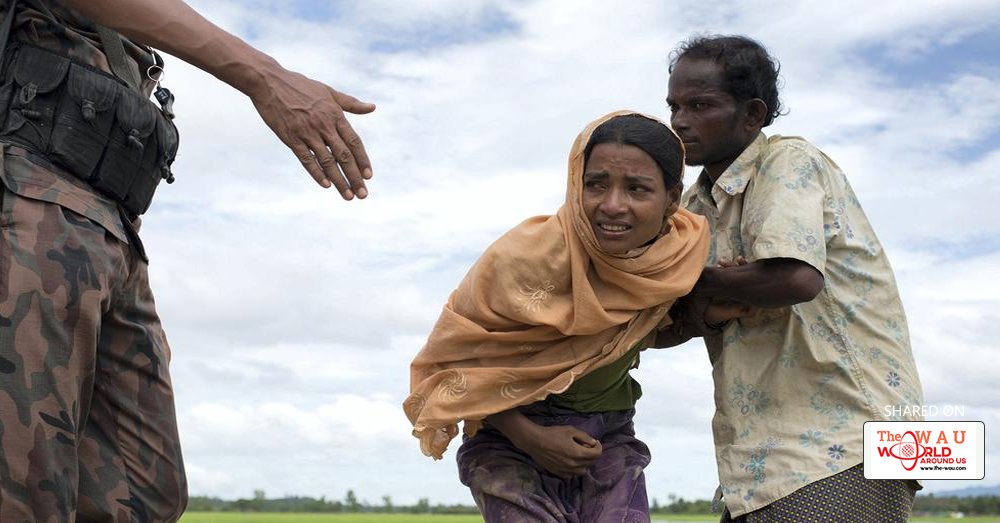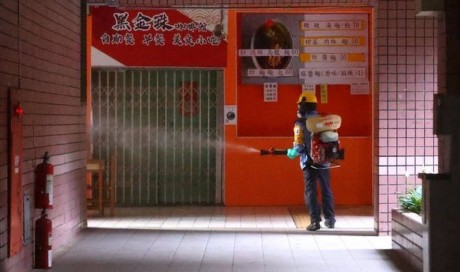Thousands of Rohingya refugees were being held at the Bangladesh border for a third consecutive day on Wednesday in an area border guards said was too dangerous for journalists and other foreigners to enter because of ongoing shooting from the Myanmar side.
An estimated 10,000 to 15,000 refugees have been trapped at the Anjuma Para border crossing area in the Ukhia district of south-east Bangladesh since Sunday night. They are on the Bangladesh side of the Naf river, which runs along the border with Myanmar, but are not being allowed to pass through the crossing to officially enter the country.
On Wednesday, as international medical staff negotiated to be allowed access to the refugees, the border guard in charge of the crossing told The National that the new arrivals were not being allowed to enter because they were not facing the same level of violence as the 580,000 other Rohingya who have fled from Myanmar to Bangladesh since August 25.
“How can I let them in? We are already entertaining 10 lakh (1 million),” he said, referring to the estimated total Rohingya population now in Bangladesh, which includes Rohingya who fled Myanmar before the latest round of violence began in August.
“Initially the violence was so serious and we entertained people who came into Bangladesh because they were so vulnerable and so helpless. Now we are already overloaded,” said Captain Rubel.
“These people come from Maungdaw because they want a better life,” he added, referring to the region of Myanmar’s northern Rakhine State that is closest to the Bangladesh border.
“Some people [have] relatives here and their relatives are encouraging them to [come] and stay here. They have problems, but it’s not the problems that are causing them to migrate."
But despite his claim that the refugees were not in danger, the captain insisted that the area was too dangerous for journalists and other foreigners — other than emergency health workers — to enter due to violence in Rakhine.
“This place is not safe. We cannot allow journalists in. We cannot take the risk. They are shooting from the other side,” he said. It is not clear who is firing the shots.
Countries are obliged to protect refugees under international law.
As The National spoke with Captain Rubel, two different refugees — one man and one woman — who had made it across paddy fields on the Bangladesh side of the Naf river were turned back from the Anjuma Para border crossing by armed guards without being allowed to see international medical staff who were running a makeshift clinic nearby.
One heavily pregnant woman with badly lacerated feet, who had to be held up by medical staff, was allowed into the centre for treatment.
Hundreds of coloured plastic tarpaulin could be seen in tight rows across the paddy fields close to the Naf river on the morning of October 18.
On Tuesday, the UN's refugee agency, the UNHCR, said the agency and its partners, the Bangladesh Red Crescent and Action against Hunger, were delivering food and water to the stranded refugees, among them children, women and the elderly who were dehydrated and hungry from the long journey. Médecins Sans Frontières was also working to identify the sick for treatment.
But when The National reached the border area on Wednesday morning, international aid workers were being denied access to the refugees. Just before midday, permission was given by border guards for aid workers to enter. Water supplies from Unicef were sent by boat across the marshland towards those sheltering in the paddy fields under tarpaulin as weather throughout the day fluctuated between baking heat and heavy rains.
Border guards also gave permission for emergency and life-saving international NGO staff to pass through the crossing from Bangladesh and treat refugees in urgent need, but told The National they would not be allowed to bring people back to the crossing for treatment.
Local residents near the border point said they believed several hundred refugees had crossed over under cover of darkness overnight, but there was no official confirmation of such figures.
Captain Rubel also denied allegations by locals that five refugees had died while trapped at the border. “I should have been the first to know if such a thing had happened,” he said.
The UNHCR said that as far as it was aware, boats carrying refugees across the Naf river to other entry points were still being allowed to enter Bangladesh on Wednesday.
But of the situation at the Anjuma Para crossing, UNHCR spokesperson Vivian Tan said: “It's extremely worrying that the refugees have been moved closer to [the river] where there are reports of nightly gunshots on the Myanmar side."
“These new arrivals are also in desperate shape, having walked for days with little food and water to seek safety in Bangladesh. They urgently need to be moved inland to the transit centre being prepared for them in Ukhia. We continue to advocate this with the authorities and have been assured that they will be moved soon.”
Bangladesh has so-far received widespread praise from the international community for hosting the massive influx of Rohingya refugees from Myanmar amid what the UN has condemned as “ethnic cleansing”.
The hundreds of thousands of Rohingya refugees who have fled Myanmar since military reprisals were launched on August 25 after attacks by insurgent group the Arakan Rohingya Salvation Army, have reported brutal killings and other attacks by the Myanmar military and Rakhine Buddhists. Hundreds of villages have been burnt. The Myanmar government has denied widespread atrocities.
Share This Post












